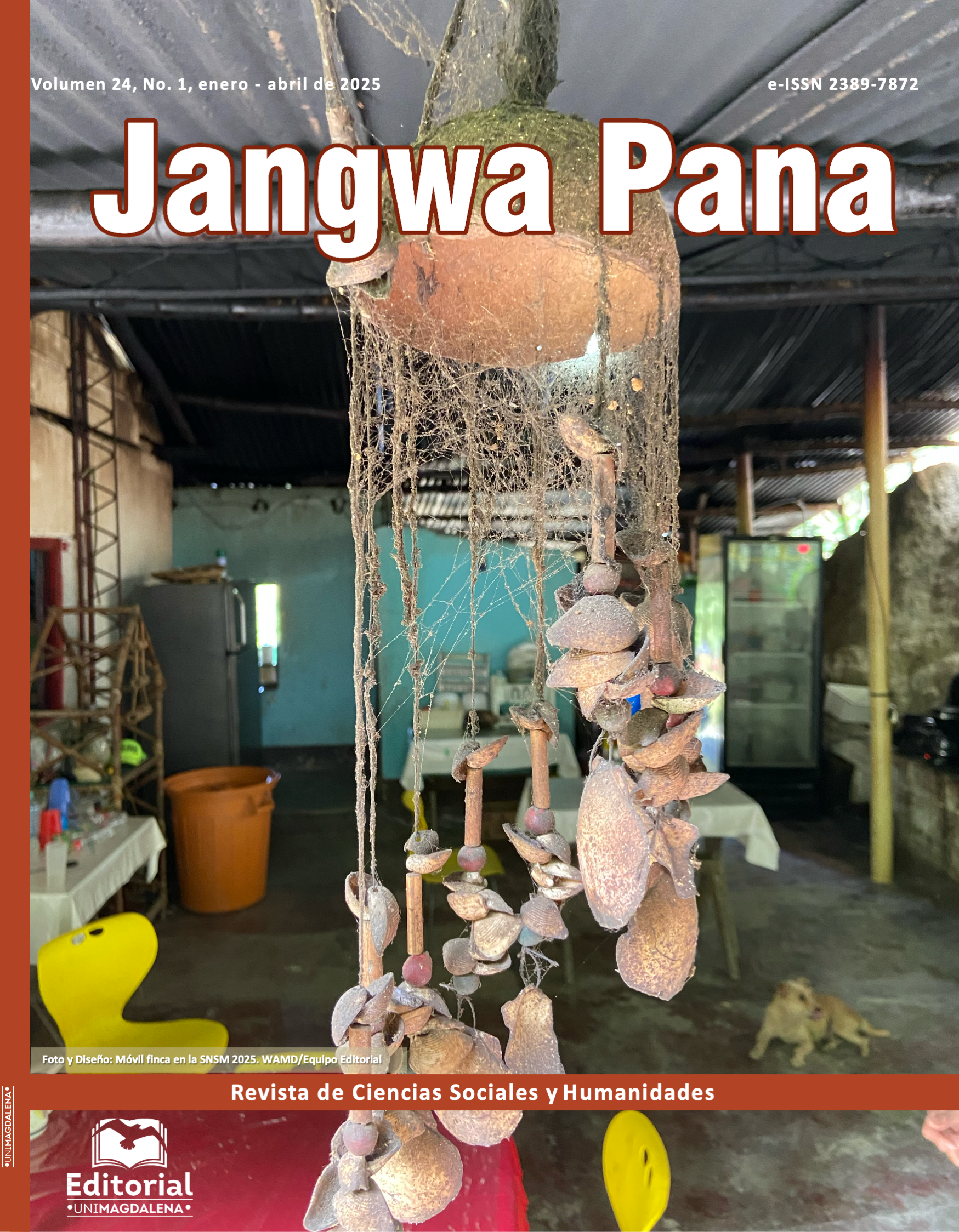Ethnography to get closer to the way of life: to go, to come back, to keep coming back
Main Article Content
Abstract
The following text aims to show how the movements in an ethnographic research allow us to break the illusion of sequentiality, and to contribute with views in different directions, as well as the behavior of the lines when they intertwine, knot and loosen. It is about the reflexive exhibition of ethnographic work, which seeks to know the way of life and in this way the mental health practices of peasant men and women in a village of Risaralda. It shows not only the issues that shape the questions, the technical decisions, but also the ways in which we relate to the participants of a research that deals with life.
Downloads
Article Details
References
Albán Achinte, A. (2009). La música del despecho: ¿el sentimiento de lo popular? Calle14, 3(3), 74-85. doi:https://doi.org/10.14483/21450706.1217
Alonso, L. E. (1998). Sujeto y discurso: El lugar de la entrevista abierta en las prácticas de la sociología cualitativa. In L. E. Alonso, La mirada cualitativa en Sociología. Una aproximación interpretativa (pp. 67-92). Editorial Fundamentos.
Bans-Akutey, A., & Tiimub, B. M. (2021). Triangulation in Research. Academia Letters(Article 3392), 1-6. doi:https://doi.org/10.20935/AL3392
Bibeau, G., & Corin, E. (1995). Culturaliser l'épidémiologie psychiatrique. Les systèmes de signes, de sens et d'actions en santé mentale. En F. Trudel, P. Charest, & Y. Breton, La construction de l’anthropologie québécoise. Mélanges offerts à Marc-Adélard Tremblay (págs. 105-148). Les Presses de l’Université Laval.
Bowen, G. A. (2009). Document Analysis as a Qualitative Research Method. Qualitative Research Journal, 9(2), 27-40. doi:https://doi.org/10.3316/QRJ0902027
Canguilhem, G. (1971). Lo normal y lo patológico. Siglo XXI editores.
Departamento Administrativo Nacional de Estadística [DANE] & Fondo de Población de las Naciones Unidas [UNFPA]. (2020). Triage poblacional Risaralda 2020. Obtenido de Departamento Administrativo Nacional de Estadística: https://www.dane.gov.co/index.php/estadisticas-por-tema/demografia-y-poblacion/triage-poblacional-territorial-de-colombia-2020
Ferro, M. (2021). Tres anotaciones sobre la etnografía desde mi experiencia como antropóloga en Colombia. In D. Bocarejo, M. Ferro, & L. Suárez Guava, La Etnografía: Problemas y soluciones (pp. 43-75). Gente Nueva Editorial.
Garrels, V., Skåland, B., & Schmid, E. (2022). Blurring Boundaries: Balancing between Distance and Proximity in Qualitative Research Studies With Vulnerable Participants. International Journal of Qualitative Methods, 21, 16094069221095655. doi:https://doi.org/10.1177/16094069221095655
Guber, R. (2019). La etnografía: Método, campo y reflexividad. Siglo XXI editores.
Gupta, A., & Ferguson, J. (1997). Discipline and Practice: «The Field» as Site, Method, and Location in Anthropology. En A. Gupta, & J. Ferguson, Anthropological Locations: Boundaries and Grounds of a Field Science (págs. 1-46). University of California Press, Ltda.
Guzmán Peñuela, L., & Suárez Guava, L. A. (2021). Acompañemos la vida en el trabajo material: Una propuesta de indagación antropológica. Revista Colombiana de Antropología, 58(1), 175-205. doi:https://doi.org/10.22380/2539472X.1992
Haraway, D. (1995). Conocimientos situados: La cuestión científica en feminismo y el privilegio de la perspectiva. En D. Haraway, Ciencia, cyborgs y mujeres. La reinvención de la naturaleza (págs. 313-346). Ediciones Cátedra.
Ingold, T. (2017a). Anthropology and/as education: Anthropology, art, architecture and design. Routledge.
Ingold, T. (2017b). ¡Suficiente con la etnografía! Revista Colombiana de Antropología, 53(2), 143-159. doi:https://doi.org/10.22380/2539472X.120
Ingold, T. (2018). La vida de las líneas. Ediciones Universidad Alberto Hurtado.
López-Pacheco, J. A. (2011). Movilización regionalista y nuevos poderes regionales: La fragmentación administrativa del Viejo Caldas y la creación de Risaralda. Sociedad y Economía(21), 125-145. doi:https://doi.org/10.25100/sye.v0i21.4043
Martínez, L. A., Ortiz, D., Viloria, J., Perdomo, J. C., Restrepo, C., & Vásquez, Á. (2010). Planes de desarrollo: Derechos humanos y exclusión Risaralda 1997- 2007. Nuevo Milenio.
Mauss, M., & Giobellina Brumana, F. (2010). Ensayo sobre el don. Forma y función del intercambio en las sociedades arcaicas. Katz.
Nates-Cruz, B., & Velásquez, P. (2009). Territorios en mutación Crisis cafetera, crisis del café. Cuadernos de Desarrollo Rural, 6(63), 11-33. Obtenido de https://revistas.javeriana.edu.co/index.php/desarrolloRural/article/view/1181
Noble, H., & Heale, R. (2019). Triangulation in research, with examples. Evidence Based Nursing, 22(3), 67-68. doi:https://doi.org/10.1136/ebnurs-2019-103145
Piñeiro, E., & Diz, C. (2018). El trabajo de campo como abandono: Una reflexión sobre la metodología de la observación participante. Revista Colombiana de Antropología, 54(1), 59-88. doi:https://doi.org/10.22380/2539472X.383
Restrepo, E. (2016). Etnografía alcances, técnicas y éticas. Envión editores.
Rodríguez Suárez, A. M. (2020). Resolver y andar en junta en un mundo que totea. Antropología de la vida campesina en San Bernardo, Cundinamarca. [Tesis pregrado, Pontificia Universidad Javeriana], Repositorio Institucional Javeriano. Obtenido de http://hdl.handle.net/10554/52150
Silva Ríos, C. E., & Burgos Dávila, C. J. (2011). Tiempo mínimo-conocimiento suficiente. La cuasi-etnografía sociotécnica en psicología social. Psicoperspectivas, 10(2), 87-108. doi:https://doi.org/10.5027/psicoperspectivas-Vol10-Issue2-fulltext-146
Tuhiwai-Smith, L. (2017). Imperialismo, historia, escritura y teoría. En L. Tuhiwai-Smith, A descolonizar las metodologías: Investigación y pueblos indígenas (K. Lehman, Trad., págs. 71-90). Txalaparta.
Vasco, L. G. (2007). Así es mi método en etnografía. Tabula Rasa(6), 19-52. doi:https://doi.org/10.25058/20112742.285

